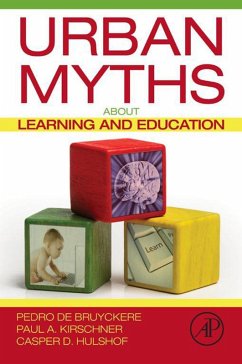Many things people commonly believe to be true about education are not supported by scientific evidence. Urban Myths about Learning and Education examines commonly held incorrect beliefs and then provides the truth of what research has shown. Each chapter examines a different myth, with sections on learning, the brain, technology, and educational policy. A final section discusses why these myths are so persistent. Written in an engaging style, the book separates fact from fiction regarding learning and education.
Recognize any of these myths?
These myths and more are systematically debunked, with useful correct information about the topic in question.
Recognize any of these myths?
- People have different styles of learning
- Boys are naturally better at mathematics than girls
- We only use 10% of our brains
- The left half of the brain is analytical, the right half is creative
- Men have a different kind of brain from women
- We can learn while we are asleep
- Babies become smarter if they listen to classical music
These myths and more are systematically debunked, with useful correct information about the topic in question.
- Debunks common myths about learning and education
- Provides empirical research on the facts relating to the myths
- Utilizes light-hearted, approachable language for easy reading
Dieser Download kann aus rechtlichen Gründen nur mit Rechnungsadresse in A, B, BG, CY, CZ, D, DK, EW, E, FIN, F, GR, HR, H, IRL, I, LT, L, LR, M, NL, PL, P, R, S, SLO, SK ausgeliefert werden.
" If ever there was a book that needed to be written for our field, Urban Myths About Learning And Education is it...should be essential reading for all graduate students, not to mention faculty, administrators (K-12 and higher education), and educational policy makers." --TechTrends
"...provides useful summaries of a wide array of issues that the authors believe are myths." --PsycCRITIQUES
"A marvelous compendium of plausible-sounding ideas about education that have seeped into popular culture, but have little or no scientific support. Carefully documented yet a pleasure to read, this book should be required reading in all teacher training programs." --Daniel T. Willingham, Professor, University of Virginia
"If ever there was a book that needed to be written for our field, Urban Mythes About Learning and Education is it. Pedro De Bruyckere, Paul Kirschner, and Casper Hulshof have created an important contribution to our literature base, a text that should be essential reading for all graduate students, not to mention faculty, administrators (K-12 and higher education), and educational policy makers. This book makes significant strides in debunking many of the prevalent misunderstandings and misinterpretations of frequently cited educational research claims. Learning styles, digital natives, multiple intelligences, and brain training, they are all here and thoroughly analyzed for their veracity."--Barbara B. Lockee, Virginia Tech for TechTrends
"...provides useful summaries of a wide array of issues that the authors believe are myths." --PsycCRITIQUES
"A marvelous compendium of plausible-sounding ideas about education that have seeped into popular culture, but have little or no scientific support. Carefully documented yet a pleasure to read, this book should be required reading in all teacher training programs." --Daniel T. Willingham, Professor, University of Virginia
"If ever there was a book that needed to be written for our field, Urban Mythes About Learning and Education is it. Pedro De Bruyckere, Paul Kirschner, and Casper Hulshof have created an important contribution to our literature base, a text that should be essential reading for all graduate students, not to mention faculty, administrators (K-12 and higher education), and educational policy makers. This book makes significant strides in debunking many of the prevalent misunderstandings and misinterpretations of frequently cited educational research claims. Learning styles, digital natives, multiple intelligences, and brain training, they are all here and thoroughly analyzed for their veracity."--Barbara B. Lockee, Virginia Tech for TechTrends


